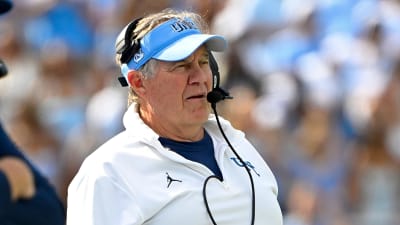
Bill Belichick’s first season in Chapel Hill was expected to bring structure, discipline, and a professional standard to North Carolina football. Ten months later, the program finds itself surrounded by questions about identity, culture, and what comes next.
The Tar Heels have struggled to find consistency on the field, sitting below .500 after a 38 to 10 loss to Clemson. The defense has shown flashes under Steve Belichick, but the offense remains stagnant, and momentum has been hard to sustain. For a program that invested heavily in a complete rebuild, the results have fallen short of expectations.
Off the field, the turbulence has been even harder to ignore. Cornerbacks coach Armond Hawkins remains suspended while the university investigates allegations that he provided extra benefits to certain players. The suspension marked another setback for a first-year staff still trying to establish trust and accountability.
The Struggle Thus Far
Belichick’s transition from the NFL to the college game has been a challenge from the start. His approach, built on hierarchy and strict control, contrasts sharply with the relationship-driven nature of college football. Managing young players, balancing recruiting, and navigating the expectations of families and fans have tested the same model that once dominated the pros.
Financially, any decision about Belichick’s future would be complex. His contract and staff commitments are estimated at more than $25 million, making a potential change costly. University officials have described the current season as part of a longer rebuild, though frustration around the program continues to grow.
Attendance at Kenan Stadium has declined, and the enthusiasm that greeted Belichick’s arrival has cooled. Alumni and donors remain divided. Some want to give him more time to reshape the program, while others believe his leadership style may never fit the college environment.
Still, Belichick’s pedigree cannot be dismissed. His strategic preparation, film study, and defensive schemes have earned respect inside the building. Some within the department believe a strong finish could stabilize the situation and quiet the outside noise.
If the Tar Heels can show progress in the final stretch of the season, Belichick is likely to remain in place heading into 2026. But if the losses continue and internal trust fails to rebuild, the university could face a difficult crossroads.
For now, North Carolina’s future under Belichick remains uncertain. What was meant to be a new chapter for the program has become a test of patience, leadership, and identity. How those are handled in the coming weeks will decide whether this experiment continues.
To
More must-reads:
- Predicting top 2026 NFL Draft QBs becoming a futile exercise
- Ohio State commit Jamier Brown sues Ohio High School Athletic Association over ban on NIL earnings
- The '2024 TD catch leaders by team' quiz
Breaking News
Trending News
Customize Your Newsletter
 +
+
Get the latest news and rumors, customized to your favorite sports and teams. Emailed daily. Always free!








